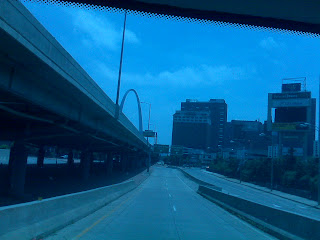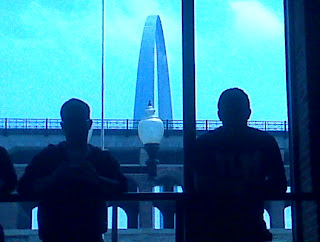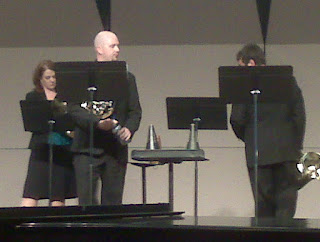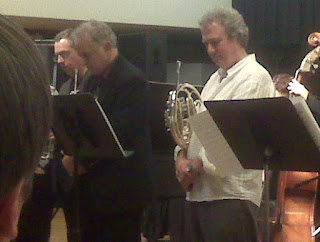JJM What was the artistic atmosphere of the 1950's prior to the jazz-poetry readings?
DA The atmosphere was wide open in those circles that we traveled in. To an extent, we opened them up ourselves by walking into places and spontaneously doing something together. In a jazz atmosphere, the audience members were so quiet and respectful of the musicians that you felt you were almost part of a meeting at a church or a temple, where everyone was completely in tune with the sermon and what the whole event was about. It was a wonderful communal feeling that was largely unspoken, and very strong and very warm. I jammed with Monk and Bird and played and recorded with the bands of Mingus, Oscar Pettiford, Lionel Hampton, Mary Lou Williams, Dizzy Gillespie, Kenny Dorham and many great players at venues that were often attended by just a handful of people. At places like the Cedar Tavern, the painters were really the center of what you might you call the social scene. They would have "bring your own bottle" parties, and people would bring something with them, whether it be a drink, a poem they had written, or a musical instrument -- or just come to hang out. They were basically informal get-togethers that were open to anybody who happened to come by and walk in, from a street person to a potential art collector who would hear through the grapevine that artists were having a party.
Esquire, in a July, 1957 issue, has a photograph of me playing the French horn at the Five Spot. The photo shows the sculptor David Smith, the painter Larry Rivers, the poet Frank O'Hara, and others as well. This picture wasn't taken in an elegant setting like Elaine's Restaurant, but rather a club where people like that were hanging out all the time. TheEsquire article associated with the photo was called "Upper and Lower Bohemia." The Upper Bohemia people wore tuxedos in an art gallery, and Lower Bohemia was all of us. The people of Upper Bohemia would come down and check out what was happening downtown. There was no such discussion of a "cutting edge." It was just all this wonderful stuff going on.

Jack Kerouac, reading 1959 photo by Fred McDarrah | JJM What are your memories of the first ever jazz-poetry reading at New York's Brata Art Gallery in 1957? DA The fact that we even did it is a miracle, because we used to do our readings on park benches or in people's apartments, or in the Café Figaro or some bar at 3:00 AM -- whatever we felt like doing. Howard Hart and Philip Lamentia thought we should try to do it in a better setting. We met with the poet Frank O'Hara, who was a link between Upper and Lower Bohemia, and who worked at the Museum of Modern Art, where we had hoped to do the readings. The people at the Museum were horrified at the idea of having any of us there. They were not about to open up their museum to a bunch of "ruffians." So, having been turned down there, we decided to do it at the Brata Art Gallery, where I was known. On occasion they would ask me to play the horn or bring some musicians to play. In exchange for playing, we would get wine, crackers, and the chance to meet a variety of fantastic artists, and perhaps even pursue romance with a young woman who was interested in art. So, we went to the Brata Gallery and they welcomed us there. I remember the day of the reading being quite rainy. In anticipation of the reading, we had a few mimeographed announcements that were handed out in the different coffee houses, bars and park benches, because that was the way everything was advertised then -- by word of mouth. To our amazement, the Brata was packed with people. There was no microphone, and nothing was planned. Jack was the emcee, and On the Road had just come out previous to that. People knew his name from the incredible reviews, but he didn't have the pressure on him then that he did even a month or two later. |
JJM The readings were pretty much spontaneous?
DA Yes. I never knew whether Jack was reading something that he made up on the spot or if it was something of his own. There may be something by Walt Whitman in there, or maybe a fragment of a poem by Hart Crane, or something from Shakespeare, Beowulf or Chaucer. He knew all of these French poets like Celine, and he would say "check this out" or "dig this" and start reciting a Celine poem from memory. He had an enormous memory for music and for jazz and the classics. He could sing the melodies from different Haydn and Beethoven string quartets. He was like an encyclopedia of music and classic literature from Europe. He also had an enormous knowledge of Buddhism. He had a tremendous knowledge of Judaism, as well as the writings from the Old and New Testaments as well as from the Mass. He had this knowledge of so many different things. When he was reading, I would submerge myself into whatever it was he was reading, and I tried to anticipate what would happen next.
JJM What instrument were you playing?
DA This was 46 years ago, and I played mostly French horn and some piano and percussion. At times I might play some kind of folkloric flute, although I didn't play those with the frequency or the skill then as I do now. I would listen very hard to what he was reading, and on the spot create music that the readings gave me ideas about. That is something that I was trained to do when playing jazz, always think ahead. When you are accompanying someone, you are listening to them the way you listen to a Bach Chorale, where four parts are going on at the same time, all of which are gorgeous melodies, all being played simultaneously. In jazz, you listen to what the bass player is doing and what the drummer is doing, what the pianist and the guitarist is doing, and then you play something that compliments that, so you are thinking simultaneously and thinking ahead. In symphonic music, when you are conducting, you do the same thing. You are feeling the whole orchestra, thinking ahead so you can prepare for a change. That enables you to accompany somebody even if it is not planned and be able to come up with something that is appropriate.
The other thing is you really have to want to submerge yourself into this situation. That is what I did with Jack, and that's why he liked to do the readings with me because he knew I was there for him, and for our ability to blend the poetry and the music. When he was reading I tried to do something to compliment the music that was already there in his reading.
--snip--
JJM Douglas Brinkley said that "Each generation rediscovers Kerouac on their own terms." How is Kerouac being "rediscovered" by today's generation of interested readers?
DA There are a lot of wonderful things created in our culture that have been ignored that can speak to them. When today's generation reads Jack's books or they listen to the music created by some of us, I believe that they see there is a different way of approaching today's life and today's sometimes seeming hopelessness that can provide answers. That by listening to some music, by reading some books, by looking at paintings, and most important by hanging out with one another -- by collaborating with one another and creating your own network -- you can achieve something that is much better than what is out there.
JJM You and your friends used the motto, "By your works ye shall be known." How will you be known?
DA I would hope it starts with my music, and would be considered compositions that exemplify what I believe is the common factor of all great music. From Bach to Bird to Bartok, all share the following in common: Purity of intent and an exquisite choice of notes. My compositions, I believe, will have lives of their own long after I am gone. They are built on the philosophy of what we used to call a selection of "choice notes." I hope my music will be of value to future musicians and artists of all kinds to inspire them to dare to tell their own story, to be themselves, and to see that art and life don't have to be separated.
_______________________________






































































